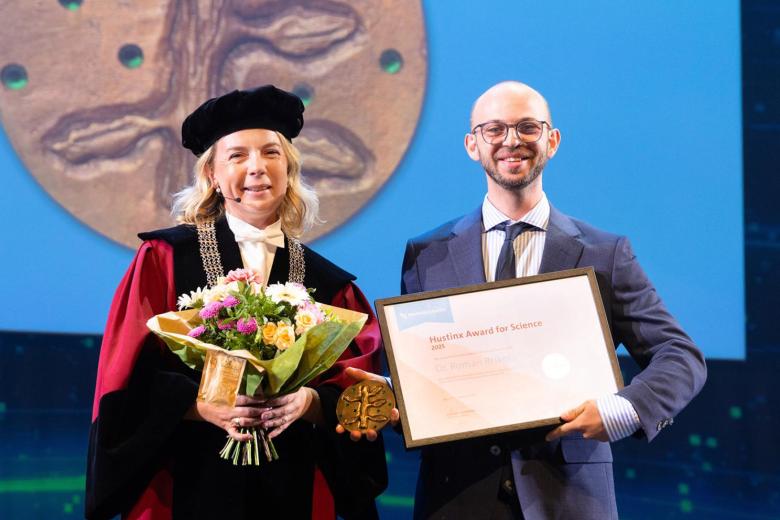Reaching for the top: How productivity gaps influence skill formation
In many industries today, a few "superstar" firms dominate while many others lag behind. This concentration contributes to wage inequality, reduced aggregate productivity, and diminished competition and innovation. In countries with many small and medium enterprises (SMEs), this dominance can limit the supply of skills and deplete growth opportunities for these businesses. What sets these leading firms apart? What skill-building strategies do they employ? These questions are central to Mantej Pardesi's PhD project, "Please Mind the 'Productivity' Gap," which explores how firms compete for skills by training and hiring to narrow the gap with industry leaders.
Productivity growth changes the way firms build skills
Why should we be concerned about rising differences in productivity between firms? These gaps impact more than just individual businesses—they affect wages, job opportunities, and the overall economy. In the furniture industry, for example, companies like IKEA leverage automation technologies and global supply chains to operate efficiently. Smaller furniture makers, however, struggle to compete with these innovations and connections, especially when such advancements are not accessible to them. Globalization allows larger firms to source cheaper materials from various countries, further enhancing their productivity advantage. These widening productivity gaps also put pressure on cooperative institutions, such as the German Apprenticeship System, where small and large firms collaborate to train skilled workers. As some companies fall behind, their ability to contribute to these training systems weakens.
Firms invest in training workers when the expected benefits outweigh the costs. They train apprentices in technical and vocational skills, preparing them as future employees. In a heavily industrialized economy like Germany, approximately 50% of each graduating school cohort chooses an apprenticeship track. However, demographic shifts and an increasing focus on academic education have reduced the number of students applying for these apprenticeships. On the demand side, highly productive firms, equipped with advanced technologies, can offer more comprehensive training programs and better career prospects than their less productive counterparts. This disparity can lead to a talent drain, where skilled apprentices are attracted to high-performing firms, leaving smaller businesses struggling to fill positions. Consequently, the overall skill formation ecosystem is jeopardized, as fewer firms participate in the apprenticeship model, reducing the number of trained workers entering the job market.
In my research, I study how inequality between firms affects the transition from school to work for apprentices in Germany. I examine whether this inequality causes firms to change their training strategies, and what impact these changes have on young apprentices’ careers.
The first part of my project tackles the research objective head on: Do firms that compete and catch-up to these highly productive firms change their demand for apprentices? My findings show that, on average, these firms do cut back on apprenticeships, especially larger, innovative companies. This is because as they become more efficient, they focus on reducing costs, including training expenses, and new technologies reduce the need for apprentices with vocational skills. This implies that the financial mantra of continuous growth and efficiency enhancements comes at the cost of a declining demand for apprentices. In the next phase of my project, I will explore how technology and training quality shape apprentices' career prospects.
Recently, I had the opportunity to present these findings at the International Workshop on Applied Economics of Education in Catanzaro, Italy. The IWAEE is an annual conference that consists of academics from around the globe including researchers from Harvard University, Michigan State University, and others. Set in the picturesque town of Catanzaro in Southern Italy, the conference allowed me to provide a skill demand perspective to questions on school-to-work transition. In my presentation, I showed graphs on productivity differences before explaining the consequences of such differences on our education systems. The valuable and critical feedback from the audience made me confident of my contribution to the literature and belief in my science. At the end of the day, belief and confidence are the invisible pillars of any PhD project.
I believe my research has practical implications for how education systems respond to inequality between firms. When apprentices are trained by less efficient firms, the quality of training may suffer, leading students to feel that vocational education does not adequately support their career ambitions. This could push them to seek alternatives outside the traditional apprenticeship track. A "winner-takes-all" mentality works in certain markets, but it is counterproductive when trying to meet the broader goals of skill formation and sustainable employment. This raises important questions: Why do highly efficient firms avoid hiring apprentices? How can we make apprenticeships more appealing for firms to engage in? These are critical discussions we need to have when addressing the future of sustainable employment and training relationships.
I want to thank MORSE for their support via the travel expenses grant and to the organisers of the IWAEE for facilitating such a vibrant exchange of ideas. If you are interested in learning more about my research or exploring potential collaborations, feel free to get in touch.

Also read
-
Prof. Dr. Wim Gijselaers receives prestigious AERA Distinguished Career Award
Prof. Dr. Wim Gijselaers has received the Distinguished Career Award from AERA Division I, recognising his pioneering research, mentorship and decades of leadership in education in the professions.

-
Research on AI in the workplace: Dr. Roman Briker wins Hustinx Science Award
The School of Business and Economics is proud to share that Dr. Roman Briker, Assistant Professor of Organisational Behaviour, has been awarded the 2025 Hustinx Science Award.

-
Financial Times MiM Ranking 2025: Maastricht University SBE #1 in the Netherlands, Top 100 Worldwide
We are proud to share that Maastricht University’s School of Business and Economics (SBE) has been ranked among the top 100 business schools worldwide and #1 in the Netherlands by the Financial Times in the Masters in Management (MiM) Ranking 2025. This recognition highlights the quality, impact...
